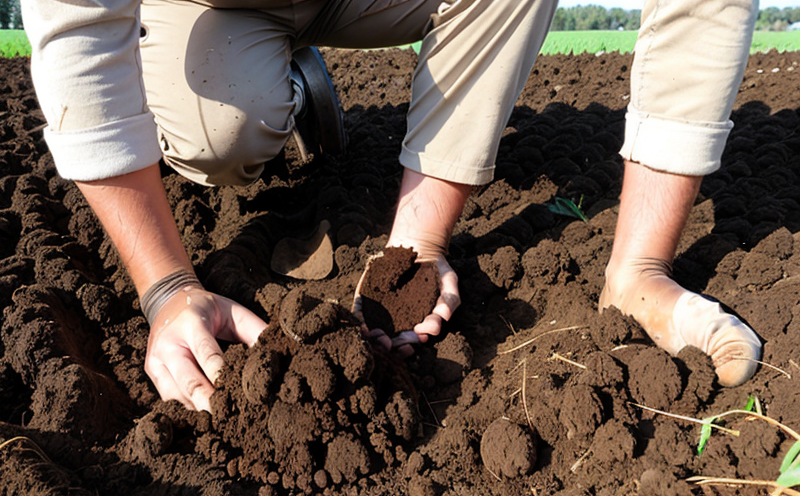Soil Calcium Content Testing
The testing of soil calcium content is a critical component in agricultural and forestry management. Calcium plays a pivotal role in enhancing plant growth and overall soil health, making it essential for ensuring optimal crop yields and sustainable land use practices. Soil calcium content influences the availability of other essential nutrients like phosphorus, which can lead to deficiencies if not properly managed.
Calcium is one of the primary cations that contribute to soil structure, aiding in the formation of stable aggregates. This stabilization improves water infiltration, aeration, and nutrient retention, all crucial factors for maintaining healthy soils. In agricultural settings, understanding calcium levels helps farmers make informed decisions regarding fertilization strategies, irrigation practices, and overall land management.
In forestry, the presence or absence of adequate calcium content can affect tree growth and root development. Calcium deficiency in trees has been linked to stunted growth and increased susceptibility to diseases. Regular testing ensures that forest managers can address these issues proactively by adjusting soil amendments as needed.
For quality managers and compliance officers, accurate soil calcium content testing is indispensable for meeting environmental regulations and ensuring product quality. R&D engineers benefit from this service as it provides insights into how different levels of calcium affect plant physiology and growth rates under various conditions. Procurement teams can leverage the results to source appropriate fertilizers and soil amendments that meet specific nutritional requirements.
Testing typically involves collecting soil samples from representative areas within a field or plot, ensuring a diverse mix of soil types is represented. The samples are then prepared according to standard protocols before being analyzed using advanced spectroscopic methods such as Inductively Coupled Plasma Mass Spectrometry (ICP-MS) or Flame Atomic Absorption Spectrophotometry (FAAS). Reporting includes detailed results along with recommendations for optimal calcium levels based on crop type and land use.
Understanding the importance of soil calcium content is not just about immediate agricultural benefits; it also contributes significantly to long-term sustainability goals. Properly managed soils contribute positively to carbon sequestration, reduce erosion risks, and promote biodiversity—all key aspects of environmental stewardship.
- Carbon Sequestration: Healthy soils with balanced calcium levels are better able to store carbon dioxide in their organic matter.
- Erosion Control: Stable soil aggregates formed by adequate calcium content help prevent wind and water erosion.
- Biodiversity Enhancement: Rich, fertile soils with appropriate mineral balances support a wider range of plant species, which in turn attract more diverse wildlife populations.
In conclusion, accurate testing for soil calcium content is an integral part of maintaining sustainable agricultural practices and ensuring optimal forestry growth. By understanding the nuances of this essential nutrient's role, stakeholders can implement effective management strategies that lead to healthier crops and forests while contributing positively to environmental sustainability.
Why It Matters
The importance of soil calcium content cannot be overstated in agricultural and forestry contexts. Calcium serves as a crucial component for several vital biological processes within plants, including cell wall structure, root development, and chlorophyll synthesis. Adequate levels of calcium are necessary to support robust plant growth, which translates directly into higher yields and better quality produce.
From an environmental standpoint, maintaining balanced soil calcium content is essential for preserving the health of ecosystems. Calcium plays a significant role in preventing soil acidification, which can lead to reduced nutrient availability and increased pollution levels. By keeping soil pH within recommended ranges through proper management practices informed by accurate testing results, we ensure that agricultural systems remain productive without compromising natural resource integrity.
The economic implications are equally compelling. Farmers who neglect calcium testing risk significant financial losses due to crop failures or suboptimal harvests resulting from nutritional deficiencies. Conversely, those who invest in regular testing and subsequent corrective actions can expect improved productivity, enhanced resilience against adverse weather conditions, and better market positioning thanks to premium product offerings.
Forestry operations similarly stand to gain substantial benefits by integrating soil calcium content assessment into their decision-making processes. Healthy forests with balanced mineral profiles are more resistant to pests and diseases, leading to longer-lasting timber resources and improved forest ecosystem services such as carbon storage and water regulation.
In summary, recognizing the significance of soil calcium content extends beyond mere agronomic considerations; it encompasses broader ecological dimensions that impact both human well-being and planetary health. The ongoing challenge lies in balancing these various interests effectively through informed decision-making supported by robust scientific data.
Eurolab Advantages
At Eurolab, we pride ourselves on providing cutting-edge soil calcium content testing services tailored specifically to meet the needs of our clients across diverse sectors. Our state-of-the-art laboratories employ internationally recognized methodologies and equipment to ensure precision and reliability in every measurement.
We offer comprehensive analysis packages designed to give you clear insights into your soil's nutritional status, enabling informed decisions about necessary amendments or adjustments. This service not only helps maintain optimal growing conditions but also supports compliance with local and international regulations regarding agricultural practices.
Our dedicated team of experts combines extensive experience in soil science with the latest technological advancements to deliver accurate results swiftly. Whether you're a large-scale farmer, smallholder, or forest manager, Eurolab can customize our offerings to suit your unique requirements. Our commitment to excellence ensures that every client receives personalized attention and support throughout their testing journey.
In addition to delivering precise analytical outputs, we also provide detailed interpretative reports alongside actionable recommendations based on the test findings. These insights help guide sustainable land management strategies aimed at maximizing yields while minimizing environmental impact.
By choosing Eurolab for your soil calcium content testing needs, you're investing in a partner committed to excellence and innovation within the field of agricultural and forestry science.





